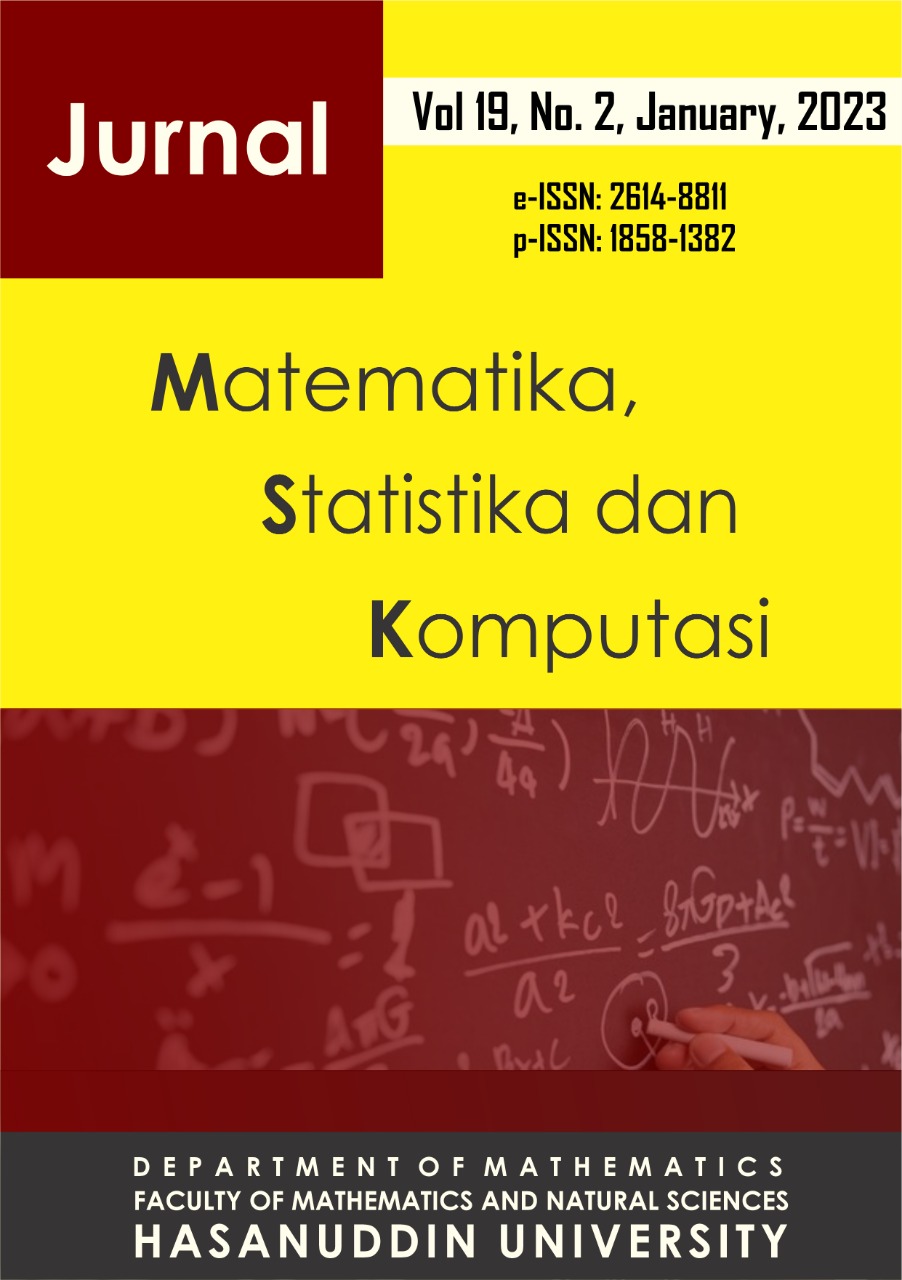Modeling of COVID-19 Cases in Indonesia with the Method of Geographically Weighted Regression
DOI:
https://doi.org/10.20956/j.v19i2.23481Keywords:
Selected:COVID-19 Pandemic, Geographically Weighted Regression, Cross-Validation, Coefficient of DeterminationAbstract
The COVID-19 pandemic has spread to all corners of the world, including Indonesia. Various factors affect the spread of COVID-19 cases in an area so that the government and the community can make prevention and control efforts so that this pandemic does not spread. This study aims to model the number of COVID-19 cases in Indonesia using the Geographically Weighted Regression (GWR) method, which develops a linear regression model. The GWR model uses weights based on the location of each observation so that the model is obtained for that location. Determine the weighting on the bandwidth. Optimum bandwidth selection is obtained by minimizing the value of Cross-Validation (CV). The GWR model using a fixed bisquare kernel weighting function has an optimum bandwidth of 0.999948 with a minimum CV value of 397.076.128 with a coefficient of determination R2 of 85.1 %. The results show that the number of positive cases positively correlates with the number of patients who died from COVID-19. In contrast, the number of recovered patients negatively correlates with the number of patients who died from COVID-19.
References
Anselin, L.,1988. Spatial Econometrics: methods and models. Dordrecht. Kluwer Academic Publishers, 1988.
Brundson, C., Fotheringham, A.S., dan Charlton, M.E., 1996. Geographically Weighted Regression: Method for Exploring Spatial Nonstationarity. Geographical Analysis, 28(4), 281-298.
Fajar, M., 2021. Pemodelan Parametrik Kurva Pertumbuhan Epidemi Covid-19 Di Indonesia. Jurnal Matematika dan Sains: ISSN 0854-5154.
Fitrial, N.H., Fatikhurrizqi, A.., 2020. Pemodelan Jumlah Kasus Covid-19 Di Indonesia Dengan Pendekatan Regresi Poisson Dan Regresi Binomial Negatif. Seminar Nasional Official Statistics 2020: Pemodelan Statistika tentang COVID-19.
Fotheringham, A.S., Brundson, C., Charlton, M.E., 2002. Geographically Weighted Regression: The Analysis of Spatially Varying Relationship. John Wiley and Sons Ltd.
Goodchild, M.F., 1989. Spatial Autocorrelation. Norwich: Geobooks, Norwich.
Ma, Z., Xue, Y., Hu, G., 2020. Geographically Weighted Regression Analysis for Spatial Economics Data: A Bayesian Recourse. International Regional Science Review XX(X).
Mahdy, Ilham,F., 2020. Pemodelan Jumlah Kasus Covid-19 Di Jawa Barat Menggunakan Geographically Weighted Regression. Seminar Nasional Official Statistics 2020: Statistics in the New Normal: A Challenge of Big Data and Officials Statistics. Departemen Statistika, Universitas Padjadjaran.
Ogundokun, R., O. Lukman, A., F. Golam B.M. Kibria, F.,G. Awotunde, J., B. Aladeitan, B., 2020. Predictive Modelling of COVID-19 Confirmed Cases In Nigeria. Infectious Disease Modelling 5.
Purhadi & Yasin,. 2008. Mixed Geographically Weighted Regression Model (Case Study: the Percentage of Poor Households in Mojokerto 2008. European Journal of Scientific Research, 188-196.
Putra, R., Tyas, S.W., Fadhlurrahman, M.G., 2022. Geographically Weighted Regression with The Best Kernel Function on Open Unemployment Rate Data in East Java Province. ENTHUSIASTIC: International Journal Of Statistics And Data Science. Volume 2, April 2022.
Sameni, R., 2020. Mathematical Modeling of Epidemic Diseases; A Case Study of the COVID-19 Coronavirus. Quantitative Biology: Cornell University.
Song, Y., Shen, Z., Wul, P., Rossel, R.A.V., 2021. Wavelet Geographically Weighted Regression For Spectroscopic Modelling Of Soil Properties. Scientific Reports: https://doi.org/10.1038/s41598-021-96772-z
Susilo A., Rumende C.M., Pitoyo C.W., Santoso W.D., Yulianti M, Herikurniawan H., et al., 2020. Coronavirus Disease 2019: Tinjauan Literatur Terkini. Jurnal Penyakit Dalam Indonesia, Vol. 7(1), Hal. 45–67.
Teguh, R., Sahay, A.S., Adjib. F.F., 2020. Pemodelan penyebaran Infeksi COVID-19 di Kalimantan. Jurnal Teknologi Informasi.
Downloads
Published
How to Cite
Issue
Section
License
Copyright (c) 2023 Author and publisher

This work is licensed under a Creative Commons Attribution 4.0 International License.

This work is licensed under a Creative Commons Attribution 4.0 International License.
Jurnal Matematika, Statistika dan Komputasi is an Open Access journal, all articles are distributed under the terms of the Creative Commons Attribution License, allowing third parties to copy and redistribute the material in any medium or format, transform, and build upon the material, provided the original work is properly cited and states its license. This license allows authors and readers to use all articles, data sets, graphics and appendices in data mining applications, search engines, web sites, blogs and other platforms by providing appropriate reference.







